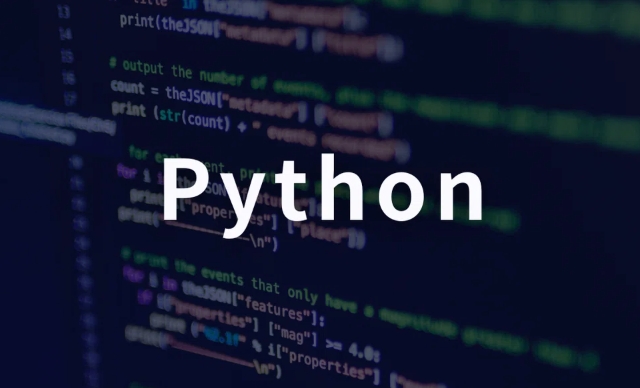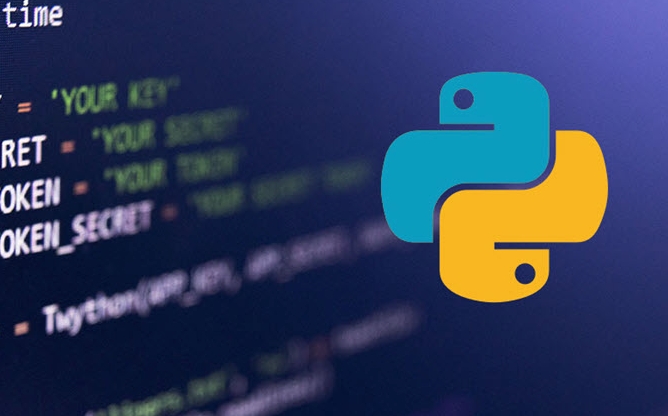 Backend Development
Backend Development
 Python Tutorial
Python Tutorial
 What are the most useful VS Code extensions for Python developers?
What are the most useful VS Code extensions for Python developers?
What are the most useful VS Code extensions for Python developers?
- The essential Python extension by Microsoft provides IntelliSense, debugging, code navigation, and interpreter support. 2. Pylance enhances editing with fast type-aware autocomplete, advanced type checking, and rich hover tooltips. 3. The Jupyter extension enables running notebooks, interactive cells, and conversion between .py and .ipynb files. 4. Black Formatter ensures PEP 8 compliance with automatic, low-configuration code formatting. 5. Flake8 or Pylint improve code quality through linting, with Flake8 being faster and Pylint more customizable. 6. Python Test Explorer simplifies test discovery, execution, and debugging for unittest and pytest. 7. GitLens adds powerful Git insights like blame annotations and commit tracking for better collaboration. Bonus tools include Code Runner for quick script execution, Todo Tree for tracking comments, and Remote - SSH/WSL for remote development, together creating an efficient, well-rounded Python environment in VS Code.

For Python developers, Visual Studio Code (VS Code) becomes a powerful IDE largely thanks to its rich ecosystem of extensions. Here are the most useful ones that enhance productivity, code quality, and debugging:

1. Python (by Microsoft)
This is the essential foundation. The official Python extension from Microsoft provides:
- IntelliSense (code completion, parameter suggestions)
- Syntax highlighting and linting
- Debugging support (breakpoints, variable inspection)
- Code navigation (Go to Definition, Find References)
- Virtual environment detection and interpreter selection
Without this, you’re not really doing Python development in VS Code.

2. Pylance
Built on top of the Python extension, Pylance supercharges your editing experience with:
- Fast, type-aware autocomplete
- Advanced type checking and function signature help
- Better import suggestions and auto-imports
- Hover tooltips with rich documentation
It uses the Language Server Protocol (LSP) for smoother performance and is now the default language server when you install the Python extension.

3. Jupyter
If you work with notebooks or data science:
- Run Jupyter notebooks directly in VS Code
- Interactive Python cells with rich output (plots, tables)
- Convert
.pyfiles to.ipynband vice versa - Support for live share and remote kernels
This extension bridges the gap between script-based development and exploratory data analysis.
4. Black Formatter
Maintains consistent code style automatically:
- One-click or on-save code formatting
- Enforces PEP 8 compliance with opinionated rules
- Minimal configuration needed — "it just works"
Pair it with isort (for import sorting) and autoDocstring (for generating docstrings), and your code stays clean with zero effort.
5. Flake8 or Pylint (Linting Tools)
Choose one based on your preference:
- Flake8 is fast and catches common style issues and bugs
- Pylint is more thorough and customizable
These help enforce code quality and catch errors early. You can configure them via settings.json or project-level config files.
6. Python Test Explorer
Makes unit testing easier:
- Discover and run tests (unittest, pytest) from a GUI
- See pass/fail status inline
- Debug tests directly
Especially helpful when working with large test suites.
7. GitLens
Not Python-specific, but invaluable for team workflows:
- View git blame annotations inline
- Compare branches and commits
- Track who changed what and why
Helps understand code history in collaborative Python projects.
Bonus Tips:
- Use Code Runner to quickly execute Python scripts with a shortcut.
-
Todo Tree highlights
#TODO,#FIXMEcomments so nothing gets lost. - Remote - SSH / WSL lets you develop on remote servers or Linux environments seamlessly.
Install these, configure them once, and you’ll have a near-ideal Python setup. It’s not about having the most extensions — it’s about having the right ones.
The above is the detailed content of What are the most useful VS Code extensions for Python developers?. For more information, please follow other related articles on the PHP Chinese website!

Hot AI Tools

Undress AI Tool
Undress images for free

Undresser.AI Undress
AI-powered app for creating realistic nude photos

AI Clothes Remover
Online AI tool for removing clothes from photos.

Clothoff.io
AI clothes remover

Video Face Swap
Swap faces in any video effortlessly with our completely free AI face swap tool!

Hot Article

Hot Tools

Notepad++7.3.1
Easy-to-use and free code editor

SublimeText3 Chinese version
Chinese version, very easy to use

Zend Studio 13.0.1
Powerful PHP integrated development environment

Dreamweaver CS6
Visual web development tools

SublimeText3 Mac version
God-level code editing software (SublimeText3)
 How to debug Python code in Sublime Text?
Aug 14, 2025 pm 04:51 PM
How to debug Python code in Sublime Text?
Aug 14, 2025 pm 04:51 PM
UseSublimeText’sbuildsystemtorunPythonscriptsandcatcherrorsbypressingCtrl Baftersettingthecorrectbuildsystemorcreatingacustomone.2.Insertstrategicprint()statementstocheckvariablevalues,types,andexecutionflow,usinglabelsandrepr()forclarity.3.Installth
 How to handle large datasets in Python that don't fit into memory?
Aug 14, 2025 pm 01:00 PM
How to handle large datasets in Python that don't fit into memory?
Aug 14, 2025 pm 01:00 PM
When processing large data sets that exceed memory in Python, they cannot be loaded into RAM at one time. Instead, strategies such as chunking processing, disk storage or streaming should be adopted; CSV files can be read in chunks through Pandas' chunksize parameters and processed block by block. Dask can be used to realize parallelization and task scheduling similar to Pandas syntax to support large memory data operations. Write generator functions to read text files line by line to reduce memory usage. Use Parquet columnar storage format combined with PyArrow to efficiently read specific columns or row groups. Use NumPy's memmap to memory map large numerical arrays to access data fragments on demand, or store data in lightweight data such as SQLite or DuckDB.
 How to run Python code in Sublime Text?
Aug 16, 2025 am 04:58 AM
How to run Python code in Sublime Text?
Aug 16, 2025 am 04:58 AM
Make sure that Python is installed and added to the system PATH, run python--version or python3--version verification through the terminal; 2. Save the Python file as a .py extension, such as hello.py; 3. Create a custom build system in SublimeText, Windows users use {"cmd":["python","-u","$file"]}, macOS/Linux users use {"cmd":["python3
 How to change the theme in VS Code
Aug 14, 2025 pm 01:43 PM
How to change the theme in VS Code
Aug 14, 2025 pm 01:43 PM
OpentheCommandPaletteusingCtrl Shift P(orCmd Shift PonmacOS),type"Preferences:ColorTheme",andselectittoviewallinstalledthemes.2.Usearrowkeystobrowsethemes,previewthemlive,andpressEntertoapplythechosenonesuchasDark ,Light ,Monokai,SolarizedD
 How to debug a Python script in VSCode
Aug 16, 2025 am 02:53 AM
How to debug a Python script in VSCode
Aug 16, 2025 am 02:53 AM
To debug Python scripts, you need to first install the Python extension and configure the interpreter, then create a launch.json file to set the debugging configuration, then set a breakpoint in the code and press F5 to start the debugging. The script will be paused at the breakpoint, allowing checking variables and step-by-step execution. Finally, by checking the problem by viewing the console output, adding logs or adjusting parameters, etc., to ensure that the debugging process is simple and efficient after the environment is correct.
 How to automatically format Python code in VSCode
Aug 14, 2025 pm 04:10 PM
How to automatically format Python code in VSCode
Aug 14, 2025 pm 04:10 PM
ToautomaticallyformatPythoncodeinVSCode,installBlackusingpipinstallblack,installtheofficialMicrosoftPythonextension,setBlackastheformatterinsettings.jsonwith"python.formatting.provider":"black",enableformatonsavebyadding"edit
 How to create a Python project in Sublime Text?
Aug 16, 2025 am 08:53 AM
How to create a Python project in Sublime Text?
Aug 16, 2025 am 08:53 AM
InstallSublimeTextandPython,thenconfigureabuildsystembycreatingaPython3.sublime-buildfilewiththeappropriatecmdandselectorsettingstoenablerunningPythonscriptsviaCtrl B.2.OrganizeyourprojectbycreatingadedicatedfolderwithPythonfilesandsupportingdocument
 How does the yield keyword work in Python
Aug 15, 2025 am 08:23 AM
How does the yield keyword work in Python
Aug 15, 2025 am 08:23 AM
The yield keyword is used to define a generator function, so that it can pause execution and return values one by one, and then recover from the pause; the generator function returns a generator object, has lazy evaluation characteristics, and can save memory. It is suitable for handling scenarios such as large files, streaming data, and infinite sequences. The generator is an iterator that supports next() and for loops, but cannot be rewind and must be recreated to iterate again.






